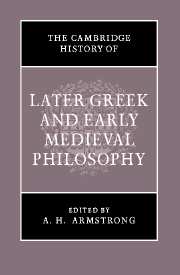Book contents
- Frontmatter
- Chapter 1 Introductory
- Part 1 GREEK PHILOSOPHY FROM PLATO TO PLOTINUS
- Part II PHILO AND THE BEGINNINGS OF CHRISTIAN THOUGHT
- Part III PLOTINUS
- Part IV THE LATER NEOPLATONISTS
- Part V MARIUS VICTORINUS AND AUGUSTINE
- Part VI THE GREEK CHRISTIAN PLATONIST TRADITION FROM THE CAPPADOCIANS TO MAXIMUS AND ERIUGENA
- Chapter 28 Introduction: Greek Christian Platonism
- Chapter 29 The Cappadocians
- Chapter 30 The pseudo-Dionysius
- Chapter 31 The reaction against Proclus
- Chapter 32 St Maximus the Confessor
- Chapter 33 The Philosophy of Icons
- Chapter 34 Johannes Scottus Eriugena
- Part VII WESTERN CHRISTIAN THOUGHT FROM BOETHIUS TO ANSELM
- Part VIII EARLY ISLAMIC PHILOSOPHY
- Select Bibliography
- Additional Notes and Bibliography
- Index of ancient and medieval works referred to in the text
- General Index
- Index of Greek terms
- References
Chapter 28 - Introduction: Greek Christian Platonism
from Part VI - THE GREEK CHRISTIAN PLATONIST TRADITION FROM THE CAPPADOCIANS TO MAXIMUS AND ERIUGENA
Published online by Cambridge University Press: 28 March 2008
- Frontmatter
- Chapter 1 Introductory
- Part 1 GREEK PHILOSOPHY FROM PLATO TO PLOTINUS
- Part II PHILO AND THE BEGINNINGS OF CHRISTIAN THOUGHT
- Part III PLOTINUS
- Part IV THE LATER NEOPLATONISTS
- Part V MARIUS VICTORINUS AND AUGUSTINE
- Part VI THE GREEK CHRISTIAN PLATONIST TRADITION FROM THE CAPPADOCIANS TO MAXIMUS AND ERIUGENA
- Chapter 28 Introduction: Greek Christian Platonism
- Chapter 29 The Cappadocians
- Chapter 30 The pseudo-Dionysius
- Chapter 31 The reaction against Proclus
- Chapter 32 St Maximus the Confessor
- Chapter 33 The Philosophy of Icons
- Chapter 34 Johannes Scottus Eriugena
- Part VII WESTERN CHRISTIAN THOUGHT FROM BOETHIUS TO ANSELM
- Part VIII EARLY ISLAMIC PHILOSOPHY
- Select Bibliography
- Additional Notes and Bibliography
- Index of ancient and medieval works referred to in the text
- General Index
- Index of Greek terms
- References
Summary
A Christian Platonist may be either a Platonist who requires to substantiate his speculations by a faith which transcends them, or a Christian who thinks of his faith, and desires to expound it, in terms intelligible to Platonists. St Augustine is the outstanding example of the former type, with whom could perhaps be associated from among the Greeks the ps.-Dionysius and Johannes Philoponus if we knew more about their origins. But the thinkers who built up the Greek Christian Platonist tradition and kept it within the bounds of orthodoxy mostly belonged to the latter: the Alexandrians, the Cappadocians, possibly the ps.-Dionysius, certainly St Maximus Confessor. And it was by following in the footsteps of these, but particularly of St Gregory of Nyssa, the ps.-Dionysius and Maximus, that Johannes Scottus Eriugena introduced this form of Christian philosophy to the West.
Three attitudes towards pagan learning were possible for the Christian: uncompromising acceptance, which led to heretical Gnosticism; uncompromising rejection, as shown by the early apologists and ascetics, favoured by the School of Antioch, and surviving into the Iconoclastic movement and into some forms of modern protestantism; and controlled acceptance, the attitude of the Alexandrians and of the writers discussed in this Part, which produced the Christian philosophy, or Christianism. This attitude acknowledges that the current philosophical systems contained elements of truth, a fact taken for granted by the Alexandrians and openly asserted, with particular reference to Platonism, by the Cappadocians, while rejecting what is evidently falsified by the Christian Revelation.
- Type
- Chapter
- Information
- Publisher: Cambridge University PressPrint publication year: 1967



